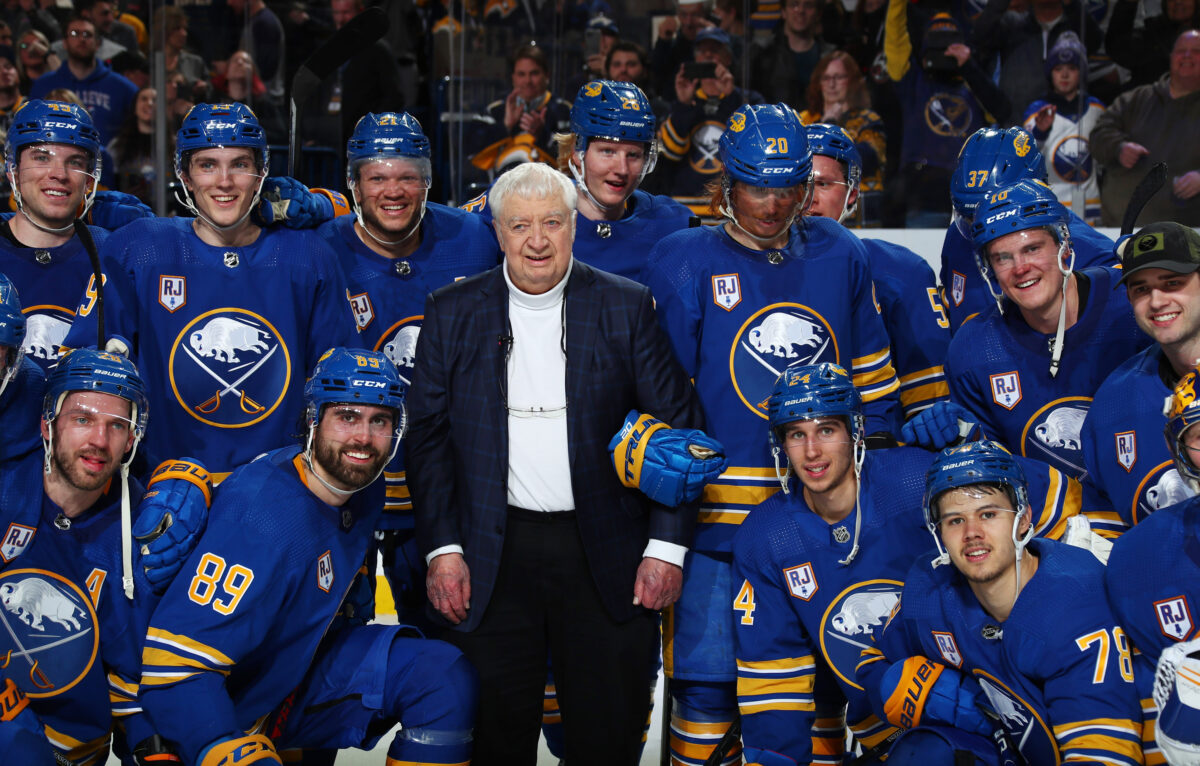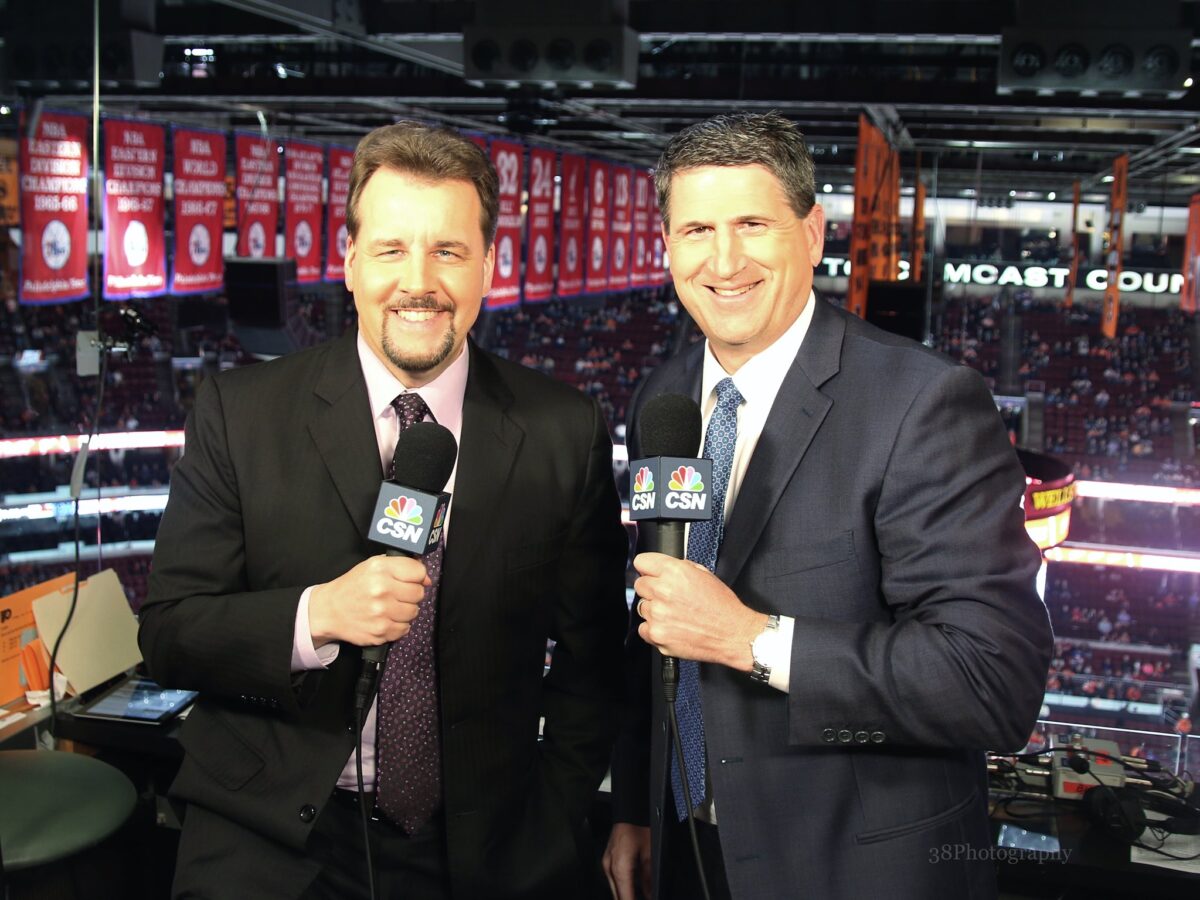The Philadelphia Flyers Hall of Fame may be a prestigious place, but it’s not limited to just players. Actually, the qualifications go beyond those that had a direct impact on the team’s on-ice success. Gene Hart, a play-by-play voice for the team from 1967 through 1995, is among the legends of the franchise. He absolutely deserves this honor.

From the moment the first puck dropped in Philadelphia with franchise icons such as Gary Dornhoefer and Bernie Parent leading the way until Eric Lindros took the spotlight with John LeClair, Rod Brind’Amour, and Eric Desjardins, Hart saw it all during his time with the Flyers. Why was he so important to the team and its history?
Born An Underdog
Hart would never be an NHL broadcaster in the modern day, let alone a legendary one. He was actually a teacher by day, but he and the Flyers agreed to make him the first play-by-play voice of the Flyers along with Stu Nahan entering their 1967-68 season. The qualifications of being a commentator of a professional hockey club today are much pickier, and years of experience are required — as it turned out, he didn’t need any of it and established himself as one of the all-time greats.
At a time when NHL hockey in Philadelphia was a completely new revelation for many people despite the Philadelphia Quakers taking over decades before the Flyers were even a thought, Hart became the voice of hockey for early Flyers fans — that is an honor that cannot be taken away from him. He was so lovable that he was kept around until 1995, which is well beyond where anyone could have pictured. One of the more notable figures in sports commentating history with over 2,000 NHL games called under his belt, the former school teacher has had an impact on multiple generations.
A Series of Iconic Calls
Even those who weren’t around when Hart was doing work for the Flyers can probably hear his voice distinctly if they follow the team — his 1973-74 season made the Flyers’ run to the Stanley Cup all the more memorable and preservable for people of all ages. Along the way, he gave his team goosebump-inducing soundbites.
Related: Keith Allen: The Architect of the Flyers’ 2 Stanley Cups
While the Flyers had decent success early on in their history, it wasn’t until 1973-74 that they truly started to break out. Their 50 wins that season put them just one point shy of the best record in the league, not just among expansion teams. This was a time when the Original Six clubs were still superior to the newer teams in the league — the Flyers were the one major exception to this at the time, rising above the historically great Montreal Canadiens and falling just short of the Boston Bruins, both of which pretty much owned the early-1970s.

Both a radio and television commentator for most of his time with the Orange and Black, that transcended his legendary status in the playoffs that season as he was able to call the season from start to finish. They had not had any true postseason success to that point, but the Flyers made it all the way to the Stanley Cup Final — it wasn’t an easy ride, either. As luck would have it, they had to face the Bruins, who were the only team that finished higher than them in the standings. This made it so they’d have to win at least one game in Boston Garden, a place where the Flyers hadn’t won since their and Hart’s inaugural season in 1967-68.
An overtime-winning goal in Game 2 of the Final on the road set up what was arguably Hart’s most iconic call on what could be argued as the franchise’s single most important goal. Taken over by excitement on the call, he knew all the Flyers just needed to win out in their barn, the Spectrum, to close out the series. That they did, and it set up his famous “Ladies and gentlemen, the Flyers are going to win the Stanley Cup!” call in the dying seconds of regulation in a 1-0 Game 6 victory that made the Orange and Black the first expansion team to ever capture hockey’s greatest trophy.
Hart’s long career can’t just be summarized by one season, but there was no campaign quite like the one where the Flyers became champions. Though they had playoff success throughout the 1980s including three appearances in the Stanley Cup Final, his career was largely defined by some of his iconic calls in 1973-74.
Fitting in With the Legends
Hart fits in with many iconic play-by-play commentators, especially those from his era. Former Buffalo Sabres broadcaster Rick Jeanneret has a case for being the best of the best when it comes to sports commentary. He did it for several decades including when the Flyers legend took over, making their careers go hand-in-hand even if Jeanneret did it for over two decades longer. In the 1970s and 1980s, those two were arguably the best voices there were to offer. For Hart, that has to be an honor.

Hart was one of the best voices of hockey in the 20th century. Even the great Mike “Doc” Emrick can attest to that, calling games for the Orange and Black himself for several seasons after the long-time Flyer did radio commentating instead of doing it both there and on television.
Related: Doc’s Orders: A Retrospective on Mike Emrick
Since both Hart and Emrick left the team, Jim Jackson has taken over duties as the play-by-play commentator through the modern day — he is one of the longest-tenured voices in his own right. For a long time, the latter used Hart’s iconic “He scores for a case of Tastykakes!” line fairly often, which served as a tribute to when the Flyers would hand out the delicious Philadelphia-based treat to players who scored the first goal during games way back when.

Until the Flyers can capture championship glory again, Hart will be the sole voice of the team for their best seasons, even if both Emrick and Jackson have done a marvelous job. His memory has been preserved for over a half-century in the art of play-by-play, and that can never be taken away. No matter who comes after him, he may always be regarded as the most important voice this team has ever had.